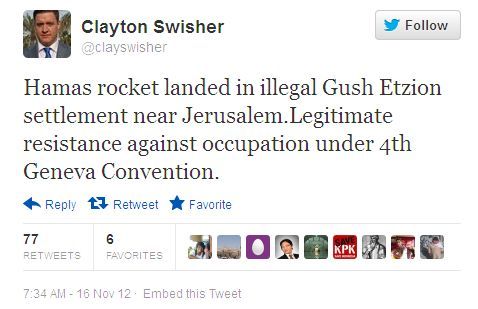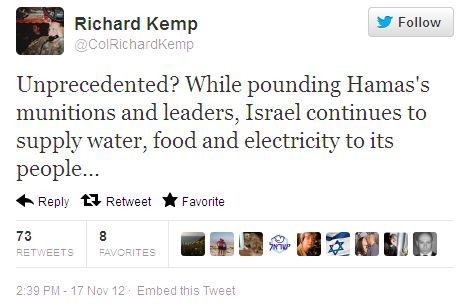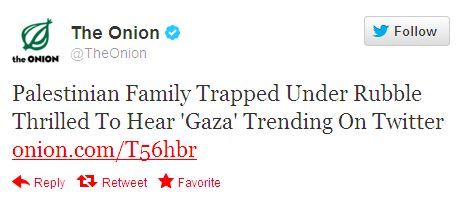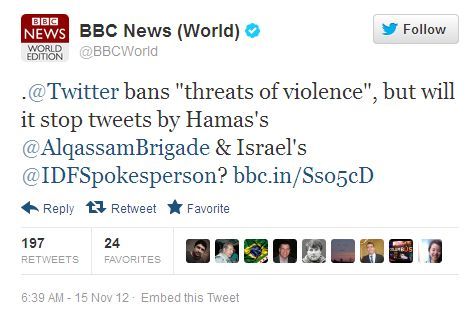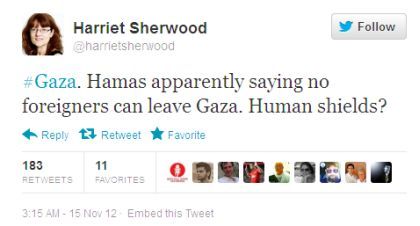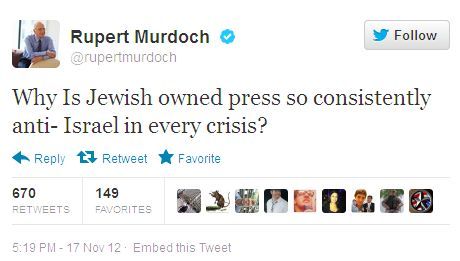I’m liveblogging the media war from the HonestReporting headquarters in Jerusalem. Come back to this page throughout the day for the latest developments.
This is Sunday’s liveblog. For Monday’s click Liveblogging Israel’s Media War 11/19/2012.
For the duration of the Gaza conflict, turn to HonestReporting for everything you need to know.
8:02 pm: Times of Israel: Hamas rocket chief Yihya Abiya was killed in an Israeli airstrike assisted martyrdom operation.
Meanwhile, Ismail Haniyeh went into hiding. I guess his speeches about martyrdom-seeking and sacrificing for both Islam and Palestine don’t apply to him. True-believers, do as I say, not as I do.
4:54 pm: Israeli security official to Reuters: To increase the range of their rockets, Palestinians are stripping the explosives:
“Our assessment is that the prestige of setting off alarms deep in Israel, and being perceived as fighting on, is as important to them now as spilling our blood,” said an Israeli official briefed on security cabinet decisions.
The official and two other sources who spoke to Reuters on the matter did not specify how many of the almost 900 rockets and mortars fired since fighting erupted on Wednesday had been deliberately sapped.
4:29 pm: A by-the-numbers look at today’s rocket fire based on Jerusalem Post, Haaretz, YNet, coverage.
70. Rockets fired at Israel.
70. Gaza targets hit by the IAF.
4. Israelis injured by rockets.
5. Iron Dome batteries now deployed in the Tel Aviv area.
15. Rockets fired at Ashdod in a five-minute period.
4:12 pm: Clayton Swisher of Al-Jazeera posted one of the most disgusting tweets I’ve ever seen. Killing Jews is perfectly legal (via Elder of Ziyon).
4:01pm: Banner of Resistance Fail:
Sixty out of the 703 rockets Hamas fired during the four days of Operation Pillar of Defense fell inside the Gaza Strip on Palestinian civilians, PMO Spokesman said on Twitter on Saturday.
Only 27 of the rockets fell on urban areas in Israel.
3:56 pm: Maan News reports Sinai jihadists fired three rockets at Israel.
3:51 pm: My antennae are twitching from foreign reporters parachuting in to cover the conflict. Ethan Bronner (NY Times, who I noted earlier today) and Mitch Potter (Toronto Star) have covered Israel before.
But other names are new to me, including Judith Whelan (Sydney Morning Herald, who I presume is with a visiting delegation), and two Irish Times reporters: (Ruadhan MacCormaic and Mark Hilliard) who I’m unfamiliar with.
By the way, Potter revived the old Gaza Beach libel, writing:
The 2006 war began with the rocketmen of Gaza and a crushing response from Israeli artillery. One of those shells took out a Palestinian family on a beach picnic and Hamas and friends answered with the audacious raid ending in the capture of Israeli soldier Gilad Shalit.
3:31 pm: And Big Media still blames Israel for civilian casualties. Sheesh.
3:08 pm: Food for thought from Leslie Gelb (Newsweek).
Hamas’s leaders have a million excuses about who started shooting whom first, and how, claiming, for example, that radical groups it couldn’t control fired most of the rockets. But a month and a half ago, Hamas claimed all the credit again. Whichever terrorist group actually did the shooting, Hamas had to know full well that if rocket fire against southern Israel continued, the Israelis would not put up with it and would fire back in spades—and that Gazan civilians would be killed. Knowing that puts the responsibility for those deaths on Hamas. It’s hard to escape the thought that some of Hamas’s leaders even revel in displaying Gazan casualties as a way of scoring propaganda points against Israel, at the expense of their own dead.
3:01 pm: Your daily dose of moral equivalence: Financial Times staff-ed (click via Google News) says Hamas bears primary responsibility for the escalation but the Netanyahu government “must also take much blame for stoking resentment among Palestinians in Gaza and the West Bank for so long.”
2:56 pm: I’m reading Melanie Phillips: Between a Rock and a Hard Place.
2:52 pm: Thumbs up to CNN for profiling the human cost of rocket fire in Ashkelon. Fred Pleitgen talked to families and the the city’s mayor.
2:38 pm: Sara Sidner, are you free to leave Gaza?
2: 32 pm: Heh. The road to Gaza peace runs through Damscus.
2:14 pm: Kudos to John Lyons and The Australian for using the word terror.

Lyons also takes a closer look at psychological trauma in Sderot. It’s a story that hasn’t gotten much attention in the West:
“I call it the Qassam Generation. There are children who were born into this situation; there are children who don’t know what it’s like to play under the sun without being scared.” . . .
The effects of the attacks are psychological as much as physical. Katz runs Sderot’s mental health centre, which treats about 6000 of the town’s 24,000 people. While one in four residents is being treated, Katz says many have not come forward.
1:55 pm: Saul Singer (Wall St. Journal, click via Google News) says Iran’s the unseen hand directing this Gaza war.
If Jabari was the hand on the trigger, the arm and the head are in Tehran. Jabari’s death could severely handicap Hamas’s capabilities in the way that Hezbollah, the Lebanon-based terror group, still hasn’t fully recovered from Israel’s 2008 killing of its commander, Imad Mughniyeh. And Israel in the past week destroyed most of Hamas’s long-range arsenal, blunting the sword that Iran built to dangle over Israel from the south. But as long as the Tehran regime stays in place, the menace to Israel—whether in the form of proxy terrorism or the threat of nuclear attack—will continue.
1:35 pm: Memo to news services looking for Gaza office space: Find out who else is using the building before you sign a rental contract. This from the NY Times on the media center hit by an airstrike:
Seven journalists were injured in the first attack, around 1:40 a.m., in the Shawa and Hossari Building in downtown Gaza City, which houses two local radio stations — one run by the militant Islamic Jihad — and the offices of the Ma’an Palestinian news agency as well as the German broadcaster ARD.
1:21 pm: Col. Richard Kemp has what to say about the war.
1:13 pm: Worth reading: The Daily Telegraph conveys the kind of monster Ahmed Jabari was.
How Israel Killed Ahmed Jabari, its toughest enemy in Gaza
1:07 pm: Phoebe Greenwood, are you free to leave Gaza?
1:03 pm: Harriet Sherwood, are you free to leave Gaza?
12:58 pm: Is The Guardian’s Comment is Free section fixated on Gaza? You betcha. Today’s section features:
1. A staff-ed:
Israel’s decision to assassinate the Hamas chief of staff Ahmed al-Jabari and launch a full-scale air and sea bombardment against the militants in Gaza can be attributed to a number of factors – of which the need to stop missiles raining down on the south of the country is the least convincing.
2. Jonathan “Violence Solves Nothing” Freedland
3. Simon “War Could Spiral Out of Control” Tisdall
4. Glenn “Obama’s Kill List Policy Compels US Support for Gaza War” Greenwald
5. Dr. Izzeldin Abuelaish, who tragically lost three daughters during Operation Cast Lead, rounds out the commentary.
12:45 pm: Methinks the Daily Mail loves the smell of napalm in the morning. Apocalypse now? The headline’s too long, so a screengrab of their tweet will suffice.
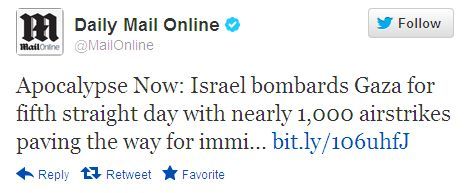
12:15 pm Fauxtography in action? You be the judge. AFP/Getty Images published images one and two of dolls lying in shards of glass. Were they planted? Similar toy story photos during the Lebanon War prompted discussion among photojournalists. As Ben Curtis wrote at the time:
When you’re covering destruction, you’re always going to focus in on details, rather than general views of destroyed buildings. You see similar pictures during a conflict like Lebanon; you see similar pictures over and over. When you come across an interesting detail in a scene . . . . But I didn’t say in my caption that children were in that apartment when it was bombed, that children were killed. I don’t know that, so I don’t say it. But if you look at my picture without the toy, you don’t know what those buildings are.
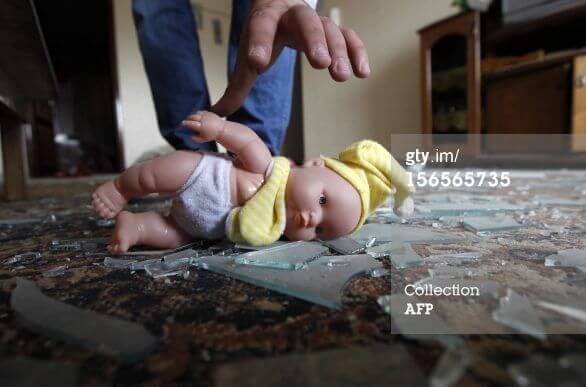
11:52 am: A lighter note from The Onion you might’ve missed:
11:42 am: Ugly AFP headline:

11:04 am: Shmuel Rosner‘s daughter spent another night in a Tel Aviv bomb shelter.
I make a living trying to understand and analyze events like the current eruption of violence in Gaza. I make a living explaining why the best hope we have today is to “end yet another cycle of violence with yet another fragile cease-fire.” But I can’t lie to my four children by telling them that such violent skirmishes are outlier events; they’re the norm, and going to the shelter might become the norm for them.
11:01 am: Ronen Bergman (NYT op-ed) worries about the effectiveness of targeted assassinations as a sustained tactic.
If, for the sake of argument, we refer to targeted assassinations as the harshest punishment in a penal “toolbox,” then, as in every penal system in the world, using it too often will not serve well as deterrence. In civil offenses, if you give equal punishment for theft and for murder, a bank robber will be taking the same risk whether or not he kills the security guard, so why not start off by killing him and increasing the probability of a successful robbery?
The result of disproportional punishment is anarchy.
10:49 am: The paper: NY Times. The dateline: Tel Aviv. The byline? Ethan Bronner — who looks at the Hamas weapons stockpile. I’m disappointed his lede starts out saying the conflict began when Israel assassinated Ahmad Jabari. Was the rocket fire leading up to it just chopped liver to Bronner?
10:40 am: Hackers are targeting Israeli web sites with some success. Anonymous is taking credit and cheerleading. If — and it’s a big if — Israel makes good on a threat to sever Gaza’s internet, you can imagine what may hit the fan.
10:20 am: Wyre Davies: Are you free to leave Gaza?
10:13 am: BBC elaborates on the Gaza media center. Moral of the story: When you rent office space, you gotta know who your neighbors are.
Our correspondent said a Hamas television station, al-Quds TV, was based in the media tower block, which had until last year housed the BBC’s Gaza office. It was still being used by Sky News and ITN.
10:10 am: Equating the IDF with Hamas, the BBC wants both kicked off Twitter (via Israel Matzav):
9:56 am: Haaretz and the Times of Israel are live-blogging. The BBC has a live feed.
9:48 am: Journalists injured in Israeli attack.
Israeli war planes have struck two media buildings in Gaza City, injuring at least eight journalists, including one who lost his leg, medical officials say.
The IDF was targeting Hamas media sites.
The Israeli military also appeared to take over the frequencies of the radio stations of Hamas and the Islamic Jihad militant group to broadcast a recorded, Arabic-language warning to the people of Gaza to stay away from Hamas installations and personnel.
I’m sure there’s more to this breaking story that we don’t know yet. A few minutes ago, I noted a DPA report that Hamas wasn’t allowing foreign journos to leave the strip. Harriet Sherwood‘s among the human shields martyrs in waiting.
9:42 am: Nice AP piece on how Iron Dome works.
9:36 am: If you’re wondering about Ambassador Michael Oren supposedly plugging dialogue with Hamas, CNN issued this correction.
An earlier version of this story included a misinterpretation of a statement made by Michael Oren, Israeli ambassador to the United States. CNN misinterpreted what Oren said when he talked about Israel’s willingness to negotiate with its neighbors if they “just stop shooting at us.” Because Gaza, which is run by Hamas, is one of Israel’s neighbors, and because Hamas is the only entity “shooting” at Israel, we thought Oren was indicating a willingness to negotiate with Hamas. Oren, in fact, did not say Israel was willing to negotiate with Hamas.
More background on the correction at Haaretz.
9:30 am: Army vehicle in Golan hit by Syrian small arms fire. Unclear so far whether the fire was deliberate or stray. JPost says there may have been Syrian casualties from the IDF’s return fire.
9:12 am: DPA reports that Hamas ain’t allowing foreign nationals — including 22 journos — from leaving Gaza. If their intention is to make them leave Gaza through Egypt, Hamas won’t score points with the media corps. They’re all based in Israel because the American Colony Hotel’s Happy Hour groupthink bar is better stocked.
And if their intention is to have human shields, will subsequent dispatches acknowledge that context? Harriet Sherwood’s tweet is on the ball, but let’s see what her coverage looks like.
9:02 am: I wonder what prompted Rupert Murdoch to tweet this.

